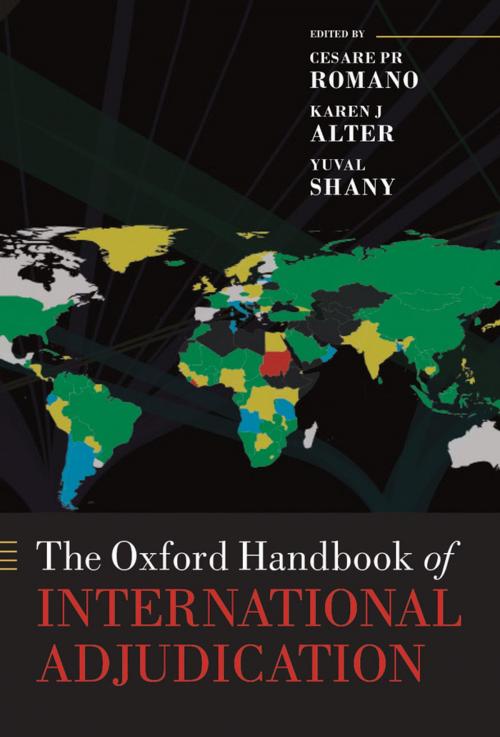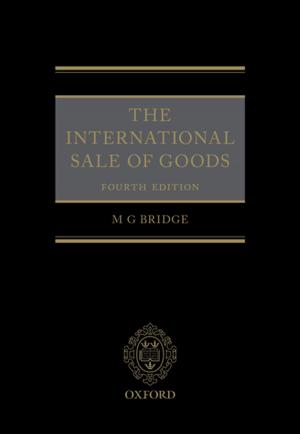The Oxford Handbook of International Adjudication
Nonfiction, Reference & Language, Law, International, Social & Cultural Studies, Political Science| Author: | ISBN: | 9780191511424 | |
| Publisher: | OUP Oxford | Publication: | January 16, 2014 |
| Imprint: | OUP Oxford | Language: | English |
| Author: | |
| ISBN: | 9780191511424 |
| Publisher: | OUP Oxford |
| Publication: | January 16, 2014 |
| Imprint: | OUP Oxford |
| Language: | English |
The post-Cold War proliferation of international adjudicatory bodies and increase in litigation has greatly affected international law and politics. A growing number of international courts and tribunals, exercising jurisdiction over international crimes and sundry international disputes, have become, in some respects, the lynchpin of the international legal system. The Oxford Handbook of International Adjudication charts the transformations in international adjudication that took place astride the twentieth and twenty-first century, bringing together the insight of 47 prominent legal, philosophical, ethical, political, and social science scholars. Overall, the 40 contributions in this Handbook provide an original and comprehensive understanding of the various contemporary forms of international adjudication. The Handbook is divided into six parts. Part I provides an overview of the origins and evolution of international adjudicatory bodies, from the nineteenth century to the present, highlighting the dynamics driving the multiplication of international adjudicative bodies and their uneven expansion. Part II analyses the main families of international adjudicative bodies, providing a detailed study of state-to-state, criminal, human rights, regional economic, and administrative courts and tribunals, as well as arbitral tribunals and international compensation bodies. Part III lays out the theoretical approaches to international adjudication, including those of law, political science, sociology, and philosophy. Part IV examines some contemporary issues in international adjudication, including the behavior, role, and effectiveness of international judges and the political constraints that restrict their function, as well as the making of international law by international courts and tribunals, the relationship between international and domestic adjudicators, the election and selection of judges, the development of judicial ethical standards, and the financing of international courts. Part V examines key actors in international adjudication, including international judges, legal counsel, international prosecutors, and registrars. Finally, Part VI overviews select legal and procedural issues facing international adjudication, such as evidence, fact-finding and experts, jurisdiction and admissibility, the role of third parties, inherent powers, and remedies. The Handbook is an invaluable and thought-provoking resource for scholars and students of international law and political science, as well as for legal practitioners at international courts and tribunals.
The post-Cold War proliferation of international adjudicatory bodies and increase in litigation has greatly affected international law and politics. A growing number of international courts and tribunals, exercising jurisdiction over international crimes and sundry international disputes, have become, in some respects, the lynchpin of the international legal system. The Oxford Handbook of International Adjudication charts the transformations in international adjudication that took place astride the twentieth and twenty-first century, bringing together the insight of 47 prominent legal, philosophical, ethical, political, and social science scholars. Overall, the 40 contributions in this Handbook provide an original and comprehensive understanding of the various contemporary forms of international adjudication. The Handbook is divided into six parts. Part I provides an overview of the origins and evolution of international adjudicatory bodies, from the nineteenth century to the present, highlighting the dynamics driving the multiplication of international adjudicative bodies and their uneven expansion. Part II analyses the main families of international adjudicative bodies, providing a detailed study of state-to-state, criminal, human rights, regional economic, and administrative courts and tribunals, as well as arbitral tribunals and international compensation bodies. Part III lays out the theoretical approaches to international adjudication, including those of law, political science, sociology, and philosophy. Part IV examines some contemporary issues in international adjudication, including the behavior, role, and effectiveness of international judges and the political constraints that restrict their function, as well as the making of international law by international courts and tribunals, the relationship between international and domestic adjudicators, the election and selection of judges, the development of judicial ethical standards, and the financing of international courts. Part V examines key actors in international adjudication, including international judges, legal counsel, international prosecutors, and registrars. Finally, Part VI overviews select legal and procedural issues facing international adjudication, such as evidence, fact-finding and experts, jurisdiction and admissibility, the role of third parties, inherent powers, and remedies. The Handbook is an invaluable and thought-provoking resource for scholars and students of international law and political science, as well as for legal practitioners at international courts and tribunals.















